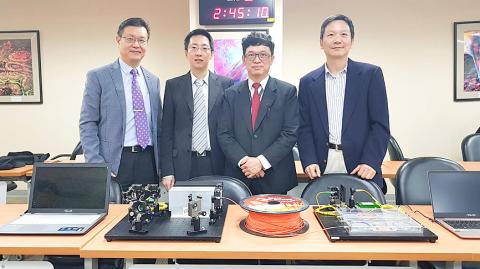A team of researchers at National Tsing Hua University (NTHU) yesterday unveiled a new cryptographic technique using quantum technology, saying that they have used it to transmit an encrypted message outside of a laboratory setting.
The team in September sent encryption keys from their university to a recipient at National Chiao Tung University via a 4km fiber-optic cable, NTHU department of physics associate professor Chuu Chih-sung (褚志崧) told a news conference at the Ministry of Science and Technology in Taipei.
The researchers used pulsed laser light to produce photons — the smallest measurable unit of light — on which they encoded binary code, he said.

Photo: Chien Hui-ju, Taipei Times
The technique, which is based on a theory of differential phase shift quantum key distribution introduced by Stanford University researchers in 2002, frustrates any hacker’s attempt to steal the code, Chuu said.
As the system tolerates an error rate of up to 2.5 percent when there is no “eavesdropper” trying to steal the code, it can detect any theft attempt as the error rate would exceed 2.5 percent, he said.
While the US, China and other countries have conducted similar experiments at various distances, the NTHU team is the first in Taiwan to transmit encrypted keys using quantum communication in a real-world environment, Chuu said.
The team next plans to experiment using the technique to transmit encrypted keys up to 10km to the Industrial Technology Research Institute, he said.
Compared with contemporary cryptography, whose encrypted messages can be deciphered by supercomputers with “faster” computing capabilities, the quantum key distribution technique makes the formulas of keys more irregular, increasing the challenges for hackers, department distinguished professor Mou Chung-yu (牟中瑜) said.
The technique would be most applicable to the financial and national security sectors, Mou said.
As semiconductor manufacturing techniques have been pushed almost to their extremes, quantum computing, widely considered to be the next significant technological revolution, is one of the ministry’s priority areas when allocating funds, Deputy Minister of Science and Technology Shieh Dar-bin (謝達斌) said.
The ministry last year provided funding for NTHU to establish the Center for Quantum Technology and is glad to see that researchers have produced preliminary results, Shieh said, adding that he expects the team’s technique to be applied to communication at longer ranges.

SECURITY: As China is ‘reshaping’ Hong Kong’s population, Taiwan must raise the eligibility threshold for applications from Hong Kongers, Chiu Chui-cheng said When Hong Kong and Macau citizens apply for residency in Taiwan, it would be under a new category that includes a “national security observation period,” Mainland Affairs Council (MAC) Minister Chiu Chui-cheng (邱垂正) said yesterday. President William Lai (賴清德) on March 13 announced 17 strategies to counter China’s aggression toward Taiwan, including incorporating national security considerations into the review process for residency applications from Hong Kong and Macau citizens. The situation in Hong Kong is constantly changing, Chiu said to media yesterday on the sidelines of the Taipei Technology Run hosted by the Taipei Neihu Technology Park Development Association. With

A US Marine Corps regiment equipped with Naval Strike Missiles (NSM) is set to participate in the upcoming Balikatan 25 exercise in the Luzon Strait, marking the system’s first-ever deployment in the Philippines. US and Philippine officials have separately confirmed that the Navy Marine Expeditionary Ship Interdiction System (NMESIS) — the mobile launch platform for the Naval Strike Missile — would take part in the joint exercise. The missiles are being deployed to “a strategic first island chain chokepoint” in the waters between Taiwan proper and the Philippines, US-based Naval News reported. “The Luzon Strait and Bashi Channel represent a critical access

‘FORM OF PROTEST’: The German Institute Taipei said it was ‘shocked’ to see Nazi symbolism used in connection with political aims as it condemned the incident Sung Chien-liang (宋建樑), who led efforts to recall Democratic Progressive Party (DPP) Legislator Lee Kun-cheng (李坤城), was released on bail of NT$80,000 yesterday amid an outcry over a Nazi armband he wore to questioning the night before. Sung arrived at the New Taipei City District Prosecutors’ Office for questioning in a recall petition forgery case on Tuesday night wearing a red armband bearing a swastika, carrying a copy of Adolf Hitler’s Mein Kampf and giving a Nazi salute. Sung left the building at 1:15am without the armband and apparently covering the book with a coat. This is a serious international scandal and Chinese

COUNTERINTELLIGENCE TRAINING: The ministry said 87.5 percent of the apprehended Chinese agents were reported by service members they tried to lure into becoming spies Taiwanese organized crime, illegal money lenders, temples and civic groups are complicit in Beijing’s infiltration of the armed forces, the Ministry of National Defense (MND) said in a report yesterday. Retired service members who had been turned to Beijing’s cause mainly relied on those channels to infiltrate the Taiwanese military, according to the report to be submitted to lawmakers ahead of tomorrow’s hearing on Chinese espionage in the military. Chinese intelligence typically used blackmail, Internet-based communications, bribery or debts to loan sharks to leverage active service personnel to do its bidding, it said. China’s main goals are to collect intelligence, and develop a